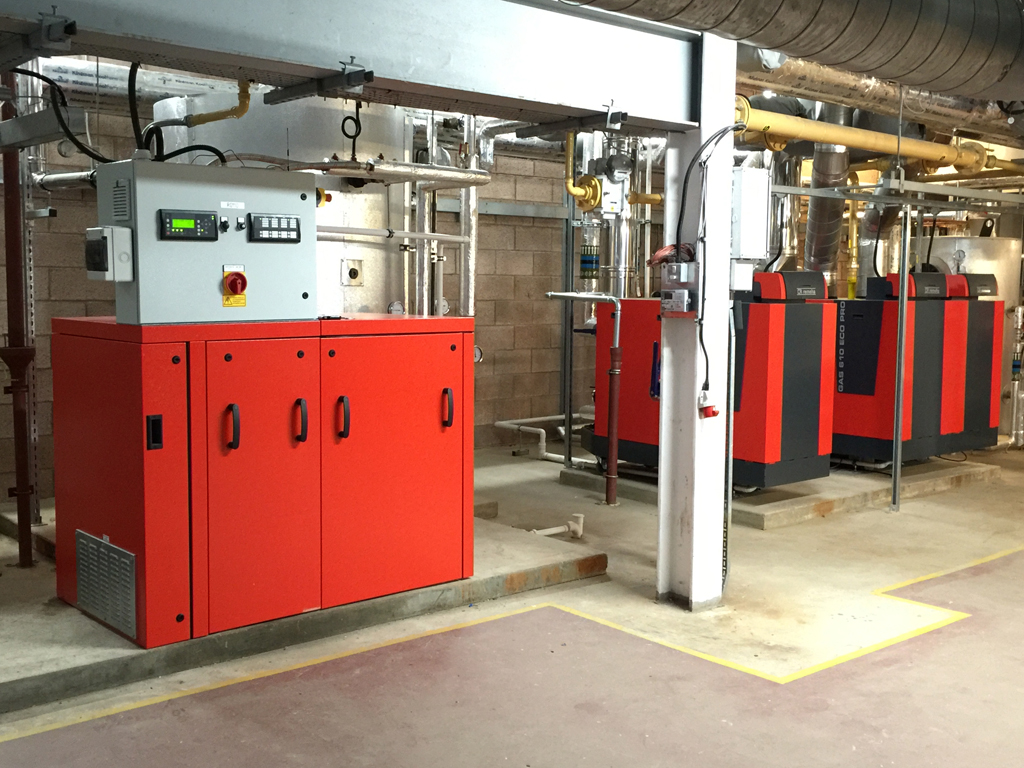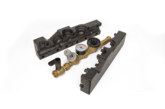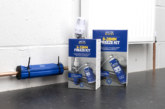Councils across the UK are turning to CHP as an economic tool to drive energy efficiency improvements at their leisure centres, minimising building emissions and energy costs. Mark Gibbons, National Sales Manager for Remeha, reports.
In today’s uncertain times, it’s clear that our existing building stock needs to be as energy-efficient as possible if we are to achieve our tighter environmental targets and make them more cost-effective to run. While every building will have its own specific requirements, in sites with high, constant heat demand, forward-thinking Councils are turning to Combined Heat and Power to meet these combined goals.
Leisure centres are a case in point, where energy costs typically amount to as much as 30% of the total operating expense, second only to the cost of labour. In complexes with swimming pools, the heating and hot water provision alone can account for as much as 65% of energy consumption. Electricity usage is also high, especially in centres that use it extensively for air conditioning, ventilation, lighting, fans, pumps and more.
Cheshire East Council is one council that is leading by example, having recently announced its ambition to become carbon neutral by 2025. When the opportunity arose to refurbish the heating system at Macclesfield Leisure Centre, one of its largest complexes, the Energy Department was keen to explore ways of reducing demand — including introducing Combined Heat and Power (CHP).
CHP generates lower-cost electricity and heat simultaneously on-site in one highly efficient process. As such, it is capable of reducing primary energy usage and bills by 30% compared with traditional generation. The greater the ‘spark spread’ — or difference between gas and electricity costs — the greater the savings from a CHP system. And with electricity prices currently at around four times the cost of gas, the resulting commercial benefits make this technology still more compelling for forward-thinking Councils.

Demand side
But here’s the caveat — to generate maximum returns, the CHP needs to run for long periods of time during the day, so it’s essential to check that the demand is there. Macclesfield Leisure Centre is well-suited to CHP. Not only is it open nearly every day of the year, but also it boasts a 25-metre swimming pool and learner pool in addition to its fully-equipped gym, studio, and changing room facilities.
“CHP was the obvious choice for us when the opportunity became available for the Council energy department to improve the efficiency of Macclesfield Leisure Centre,” says Colin Farrelly, Energy Manager at Cheshire East Council. “The leisure centre is one of our largest energy users and, as such, the impact of applying CHP will be significant across the whole estate.”
Heating system design
The design scoped by consulting engineers SVM-Building Services Design (SVM-BSD) identified a Remeha R-Gen 50/100kW ultra-low NOx condensing CHP unit working in conjunction with six Remeha Quinta Ace 160 high-efficiency condensing boilers to optimise overall system efficiency.
Pairing CHP with high-efficiency condensing boilers is an effective means of ensuring that the system performs to its full potential, reducing operational costs while generating electricity at lower gas prices. The R-Gen CHP unit operates as the lead boiler with the condensing boilers providing additional heat during peak periods when required. For SVM-BSD, there were clear advantages of using one supplier for all the components.

“Working with Remeha has ensured a smooth delivery and installation process,” said Sean. “It will also simplify future maintenance and servicing, as all spare parts can be accessed immediately from a central hub.”
Paul Towler, Director at CM Oxendale, the project M&E Contractor agreed, saying: “Having one point of contact certainly makes life much easier.”
Ensuring good integration of CHP and boilers is also key, as well as considering long-term maintenance options from the outset. Good suppliers will be able to support on both these areas.
“A major benefit for us is that the Remeha team have an in-depth understanding of both technologies which has resulted in a well-integrated system,” continues Paul. “They supported us throughout, from the design stage and hydraulic arrangement to the final ‘fine tuning’ of the system for optimum performance.”
Close collaboration
Minimising disruption was the key priority for ENGIE, the Council’s principal contractor and FM Provider, as the leisure centre needed to remain open throughout the works.
“Ensuring that the building and its services were unaffected during the works required careful planning, co-ordination and collaboration,” explains Karl Durber, ENGIE’s Senior Projects Manager. “Working in a live environment can present complex logistical challenges. But this was a really good team effort with regular progress meetings ensuring excellent communication throughout the project.”

Long-term maintenance
To ensure that the CHP operates continuously and at optimum performance throughout its lifetime, the Council has implemented a Remeha service plan. Remote monitoring is an important component of the service programme as an estimated 85% of reported CHP faults can be corrected and reset remotely.
From an FM perspective, the remote monitoring service at Macclesfield Leisure Centre provides ENGIE with peace of mind that, if a problem should occur, it can be easily resolved — often without the need for a service visit.
Now commissioned and fully operational, the CHP has been running continuously for the last two months, using all the 100kW of heat it generates per hour to heat the swimming pool, provide space heating throughout the leisure centre, feed the Air Handling Units and serve the hot water demand. The scheme has proved so successful that the Council is now installing a second Remeha R-Gen CHP unit in another of its leisure centres.
“Since 2009, when Cheshire East Council was established as part of structural changes, the Council has reduced its CO2 by 40%,” adds Colin. “Alongside our environmental goals, the Council has the ambition to improve the health of residents by providing them with access to leisure centres. So, it makes perfect sense to make them as efficient as possible — and CHP is helping us do just that.”
35% fall in primary energy usage
Eden District Council has released data indicating a 35% fall in total primary energy usage at its Penrith Leisure Centre since refurbishing the heating system with a Remeha turnkey CHP and boiler solution. Mechanical & Electrical engineers Thomas Armstrong recommended replacing the old plant with a new Remeha 20/44kW ultra-low R-Gen condensing CHP unit operating in conjunction with three Remeha Gas 310 Eco Pro high-efficiency condensing boilers.
The energy cost savings are further boosted by the ability of CHP to generate electricity on site at lower gas prices.
CHP Checklist
- Is the demand there? To reap the full potential financial benefits from CHP, the unit needs to run for long periods of time during the day
- Is the CHP correctly sized? Accurate sizing of the CHP unit is critical for maximum runtime
- Is the overall system condensing? Good integration with the system (and, in these examples, the condensing boilers) is essential to optimise system performance
- Is a service plan in place? Implementing a service plan maximises CHP lifetime efficiency and related commercial savings
- Councils across the UK are turning to CHP as an economic tool to drive energy efficiency improvements at their leisure centres, minimising building emissions and energy costs.









